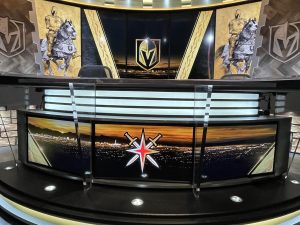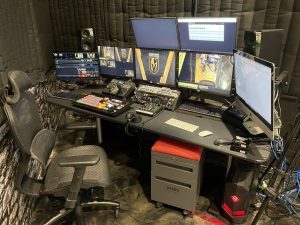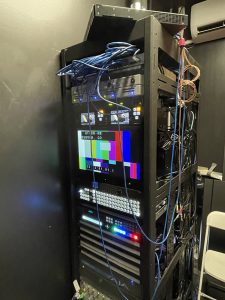Vegas Golden Knights Create Central Content Hub With New Studio at City National Arena
The studio is located next to the team’s practice rink in Summerlin, NV
Story Highlights
The Vegas Golden Knights are back on the ice for their fifth season in the National Hockey League, and the franchise is now armed with a studio at City National Arena, its headquarters and practice venue in Summerlin, NV. Opened a month before the beginning of the COVID-19 pandemic in February 2020, it’s now a fully functioning space that is hosting a hefty slate of digital content.
“COVID-19 was a really good thing for technology because it forced us to rethink how things work,” says Andrew Abrams, senior executive producer, production and venue technology, Vegas Golden Knights. “From a technological side, we wanted to make [this studio] versatile and easy to use.”
Local Advice: Club Draws Inspiration From Other Vegas-Based Facilities
More of the long-standing and traditional teams in the NHL have had ample time to develop a robust control room and production skeleton. In the case of the Vegas Golden Knights, the team was focused on producing content on the fly and in remote locations to showcase the surrounding areas on The Strip and at T-Mobile Arena. When the franchise decided to find a permanent base for elements like pre and postgame shows and live streams, the process of finding a sustainable location was a main priority.
Abrams and his colleagues leaned on the blueprints of other sports-production companies in the city, including the UFC and their construction of the Apex facility as well as the setup of the HyperX Esports Arena at The Luxor. The Golden Knights ultimately chose City National Arena, but the only problem was that there wasn’t available space inside of the building. This is where the crew got a bit creative and retrofitted a pre-existing room as the studio’s foundation.
“When the building was built, it wasn’t built to be a broadcast center, so there was no fiber or video-related equipment,” he says. “We took an oddly shaped party room and made a studio out of it.”
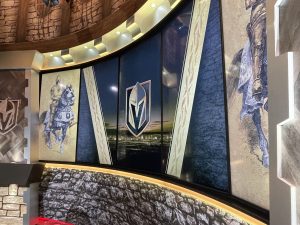
Working in tandem with AT&T SportsNet Rocky Mountain, the RSN can control these LED screens from Denver.
After the club’s experience during the construction and systems-integration stages of T-Mobile Arena in 2017, the organization tapped Alpha Video once again to work on this new project. This choice was based on their familiarity with Alpha Video’s work — the company also helped put together the control room and practice facility for the nearby Las Vegas Raiders — and their ability to install the highest-quality of live production tools. The technological footprint includes a table for a director/producer at the far corner of the space to control the NewTek TriCaster production switcher and NDI-powered BirdDog robotic cameras.
COVID Operations: AT&T SportsNet Rocky Mountain Talent Finds Home in Summerlin
The studio was assembled at a record-setting pace — starting in January 2020 and finishing in February — but when its doors officially opened, professional sports went on an extended shutdown one month later due to the COVID-19 pandemic. This disturbance in the regular sports calendar forced the team and its regional sports network, AT&T SportsNet Rocky Mountain, to adapt to the circumstances. In the past, the studio team needed to travel to the RSN’s headquarters in Colorado, but to restrict unnecessary travel, the new set became the home of this team for pregame, intermission, and postgame shows. With that thought in mind, the Golden Knights began sharing some technologies with the RSN as well create separate workflows for their own use.
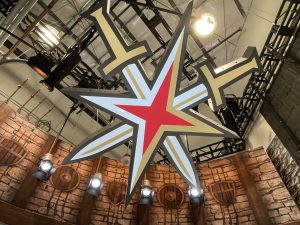
The team is branding every square foot of the space, including a hanging structure of the Golden Knights’ secondary logo.
“AT&T SportsNet Rocky Mountain always had this in mind as a remedy, and it actually worked out perfectly,” says Abrams. “We share [our robotic cameras] and lighting system with AT&T, who can control them remotely from Colorado, but our Dante audio system is on a separate infrastructure where there’s not a lot of plugging and unplugging [wires] for our shows.”
Remote and cloud-based solutions also became a gamechanger during times where a large number of individuals were still unable to be in an enclosed space. Before the eventual return of large-scale, in-person shows, contributors residing from across the country were patched in through video-conferencing applications.
“We needed to use things like Zoom because they weren’t allowed to be in the studio,” he continues. “A lot of the new technologies, like BirdDog Cloud and sending video over RTS, has definitely changed in the last two years.”
Content Fortress: Space Becomes Hub for Digital Shows, Live Streams
Aside from becoming the linear home of AT&T SportsNet Rocky Mountain’s on-air talent, the franchise is using this studio as an anchor point for all of their digital content. One of the studio’s first productions was their 2020 Trade Deadline Special prior to the pandemic. When the league resumed action in the 2020-21 season, the Golden Knights produced their Fortress at Home second-screen experience for fans who were unable to watch games in the venue. As additional ancillary conten, this studio was the backdrop for a ton of these shows, including pregame shows, Reveal Knight for the unveiling of the AHL’s Henderson Silver Knights, Morning Skate before home games, Training Camp Bulletin prior to the start of the season, The Cool Down to preview the regular-season slate, and Awards Knight to celebrate the year’s best players on the team. This year, the introduction of the new show Knight Time at Noon has been added to the programming lineup.
For some of these shows that require handheld cameras, the studio’s NDI backbone combined with the connectivity of the practice facility has allowed the crew to become mobilized. For example, Morning Skate can use a mix of Sony PTZs and handhelds for shots of the adjacent rink on the bottom floor.
“This building has an abundance of network ports, so with NDI, we knew that any network port in the building could become an encoder or decoder for us,” adds Abrams. “We’ve built a little arsenal of cameras through the years, so we’ll take our Sony FS7s, run a cable back to the studio, and we put a monitor on [the camera] for our operator.”
In addition, the building now has a 1G connection to T-Mobile Arena, Lifeguard Arena (the Silver Knights’ practice facility), and eventually, the Silver Knights’ new home at Dollar Loan Center when it opens in April 2022.
“Our IT department is great, so no matter where you are, you can pull finished content on our server,” he continues. “We used to use Dropbox, and before that, we actually drove over hard drives since we’re 10 to 15 minutes away from the arena.”
Humble Beginnings to Fruitful Future: Golden Knights Make Notable Strides With New Studio
The Golden Knights have made massive strides on the production front. This new studio is a far cry from where operations were back in 2018-19, and through the hard work of Abrams and his staff, the franchise is seeing the immediate benefits from this rapid transformation.
“We used to have a rolling table with a tripod, camera, and a HDMI-to-USB capture card in a MacBook Pro running OBS for a static one-camera shot on Facebook Live,” says Abrams. “the organization knows how valuable this studio is, so we’re putting partners on these shows as a revenue generator and we’re now able to hire someone that handles a lot of the technology for the organization.”
